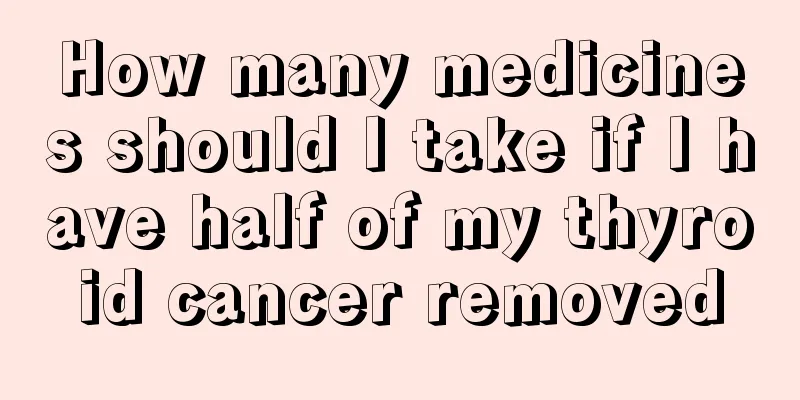What is the best treatment for stubborn urticaria

|
As the name suggests, intractable urticaria is relatively stubborn and often recurs. Sometimes, if it is not treated properly with medication, it can cause drug resistance, which often causes great harm to patients. For patients, it is necessary to eliminate the cause of the disease and prevent some inducing factors. Some antihistamines can be used under the guidance of a doctor, or some glucocorticoids can be used, but these drugs should not be used frequently to avoid side effects. 1. Eliminate the cause For each patient, efforts should be made to find the cause of the attack and avoid it. If the cause is infection, the infected lesions should be treated actively. If the allergy is caused by drugs, the allergy medication should be stopped; if the allergy is caused by food, find out the allergic food and stop eating this food. 2. Avoid triggering factors For example, for cold urticaria, you should keep warm; for acetylcholine urticaria, you should reduce exercise, sweating and mood swings; for contact urticaria, you should reduce the chance of contact. 3. Antihistamines (1) H receptor antagonists: They have strong anti-histamine and anti-other inflammatory mediator effects and are effective in treating various types of urticaria. Commonly used H1 receptor antagonists include diphenhydramine, cyproheptadine, chlorpheniramine, acrivastine, cetirizine, mizolastine, loratadine, ebastine, azelastine, desloratadine, etc.; when single treatment is ineffective, two different types of H1 receptor antagonists can be used in combination or in combination with H2 receptor antagonists. Commonly used H2 receptor antagonists include cimetidine, ranitidine, famotidine, etc. It is effective for acute, chronic urticaria and cold urticaria. Dosage varies from person to person. (2) Doxepin: It is a tricyclic antidepressant that is particularly effective for chronic urticaria and has fewer adverse reactions. Doxepin is a better choice of drug for patients with urticaria who are not responsive to traditional antihistamines. 4. Drugs that inhibit mast cell degranulation and reduce histamine release (1) Meta-hydroxyisobutyrine sulfate is a β2-adrenergic receptor stimulator that can increase the concentration of cAMP in the body, thereby inhibiting mast cell degranulation. (2) Ketotifen: It increases the concentration of cAMP in the body, inhibits mast cell degranulation, and prevents the release of inflammatory mediators (such as histamine, slow-reacting substances, etc.). Its inhibitory effect is stronger and faster than that of sodium cromoglycate, and it can be taken orally. (3) Sodium cromoglycate: It can block the binding of antigen and antibody and inhibit the release of inflammatory mediators. If used in combination with glucocorticoids, the dosage of the latter can be reduced and the therapeutic effect can be enhanced. (4) Tranilast: Reduces the release of histamine by stabilizing mast cell membranes. 5. Glucocorticoids It is a second-line drug for the treatment of urticaria. It is generally used when severe acute urticaria, urticarial vasculitis, pressure urticaria are ineffective with antihistamines, or when chronic urticaria is severely stimulated. It is given by intravenous drip or orally, and long-term use should be avoided. Commonly used drugs are as follows: prednisone; triamcinolone; dexamethasone; Diprosone. In emergency situations, hydrocortisone, dexamethasone, or methylprednisolone is given intravenously. 6. Immunosuppressants When patients with chronic urticaria have an autoimmune basis, the disease recurs, and the above treatments cannot achieve satisfactory results, immunosuppressants can be used. Cyclosporine has a good therapeutic effect. Azathioprine, cyclophosphamide, methotrexate and immunoglobulin can all be tried. Tripterygium wilfordii also has a certain therapeutic effect. Due to the high incidence of side effects of immunosuppressants, they are generally not recommended for the treatment of urticaria. |
<<: Can saline solution treat skin allergies?
>>: What does a positive hepatitis B surface antibody mean?
Recommend
What is the muscle next to the neck called
There is a muscle between our neck and shoulders ...
What to do if there is phlegm in the throat and I can't cough it out
The situation of having phlegm in the throat that...
Does colitis require surgery?
As we all know, colitis has a very serious impact...
What is the order of using water essence lotion cream eye cream?
Modern people attach great importance to their app...
My face is allergic and has a lot of small pimples
I believe that many people who do not have oily a...
What are the common symptoms of prostate cancer?
Prostate cancer is a common cancer that seriously...
Introducing the four major detailed causes of rectal cancer
Rectal cancer is a malignant tumor with a high in...
Eye bag fat filling tear trough surgery
Eye bag fat filling tear trough surgery is a comm...
How to plan a girl's fitness plan
Nowadays, people care more about their health. Ma...
What are the commonly used examination methods for fibroids?
For a serious disease like fibroid disease, we mu...
Is medullary tumor serious? What are the symptoms of medullary tumor?
Medullary tumors are tumors that grow in the medu...
How long do eggs and sperm survive?
For many young couples who want to get pregnant, ...
What is bone hyperplasia? You need to know the symptoms and signs
Bone hyperplasia is a common symptom among middle...
What is the difference between a yoga blanket and a yoga mat?
Nowadays, many people have the habit of doing yog...
Several options for tongue cancer treatment
Tongue cancer is an uncommon type of cancer. Once...









